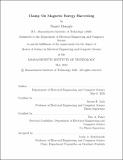| dc.contributor.advisor | Leeb, Steven B. | |
| dc.contributor.advisor | Ponce, Eric A. | |
| dc.contributor.author | Monagle, Daniel | |
| dc.date.accessioned | 2022-08-29T16:24:38Z | |
| dc.date.available | 2022-08-29T16:24:38Z | |
| dc.date.issued | 2022-05 | |
| dc.date.submitted | 2022-06-21T19:25:57.852Z | |
| dc.identifier.uri | https://hdl.handle.net/1721.1/144973 | |
| dc.description.abstract | Large-scale deployment of low-power sensing and computing units call for unique power management solutions to overcome the inconvenience, costs, and waste problems associated with batteries. Energy harvesting offers an exciting solution to the battery problem, enabling circuits that can power themselves on-site from available ambient energy. Magnetic energy harvesters, configured as current transformers (CTs), extract energy from the magnetic fields surrounding current-carrying power lines. This thesis proposes generalized analytical methods for modeling magnetic energy harvester behavior and validates these methods along with existing circuit model techniques. A simplified magnetic core permeability characterization method is introduced. This thesis is motivated by addressing the feasibility of a split-core magnetic energy harvester to power a microcontroller unit, and the models are experimentally validated for multiple harvester cores. A completely self-powered system is implemented with an energy enhancement strategy that significantly increases power harvest in the presence of core saturation. | |
| dc.publisher | Massachusetts Institute of Technology | |
| dc.rights | In Copyright - Educational Use Permitted | |
| dc.rights | Copyright MIT | |
| dc.rights.uri | http://rightsstatements.org/page/InC-EDU/1.0/ | |
| dc.title | Clamp–On Magnetic Energy Harvesting | |
| dc.type | Thesis | |
| dc.description.degree | S.M. | |
| dc.contributor.department | Massachusetts Institute of Technology. Department of Electrical Engineering and Computer Science | |
| mit.thesis.degree | Master | |
| thesis.degree.name | Master of Science in Electrical Engineering and Computer Science | |
